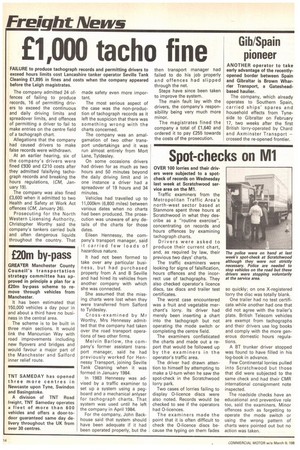0,000 tack, fine
Page 16

If you've noticed an error in this article please click here to report it so we can fix it.
FAILURE to produce tachograph records and permitting drivers to exceed hours limits cost Lancashire tanker operator Seville Tank Cleaning £1,895 in fines and costs when the company appeared before the Leigh magistrates.
The company admitted 24 offences of failing to produce records, 16 of permitting drivers to exceed the continuous and daily driving limits and spreadover limits, and offences of permitting a driver to fail to make entries on the centre field of a tachograph chart.
Allegations that the company had caused drivers to make false records were withdrawn.
At an earlier hearing, six of the company's drivers were fined £930 and £210 costs after they admitted falsifying tachograph records and breaking the hours regulations, (CM, January 19).
The company was also fined £3,600 when it admitted to two Health and Safety at Work Act offences (CM, January 26).
Prosecuting for the North Western Licensing Authority, Christopher Worthy said the company's tankers carried bulk and often dangerous liquids throughout the country. That made safety even more important.
The most serious aspect of the case was the non-production of tachograph records as it left the suspicion that there was something wrong with the charts concerned.
The company was an amalgamation of two other transport undertakings and it was run almost entirely from Mort Lane, Tyldesley.
On some occasions drivers had driven for as much as two hours and 50 minutes beyond the daily driving limit and in one instance a driver had a spreadover of 19 hours and 34 minutes.
Vehicles had travelled up to 11,000km (6,800 miles) between various dates when no charts had been produced. The prosecution was unaware of any details of the charts for those dates.
Eileen Hennessy, the company's transport manager, said it carried few loads of hazardous nature.
It had not been formed to take over any particular business, but had purchased property from A and B Seville and had hired its vehicles from another company with which she was connected.
She assumed that the missing charts were lost when they were transferred from Salford to Tyldesley.
Cross-examined by Mr Worthy, Mrs Hennessy admitted that the company had taken over the road transport operations of two other firms.
Melvin Barlow, the company's former assistant transport manager, said he had previously worked for Hennessy Transport, joining Seville Tank Cleaning when it was formed in January 1984.
In 1983 Hennessy was advised by a traffic examiner to set up a system using a pegboard and a mechanical anlyser for tachograph charts. That system was used until he left the company in April 1984.
For the company, John Backhouse said that system should have been adequate if it had been operated properly, but the then transport manager had failed to do his job properly and offences had slipped through the net.
Steps have since been taken to improve the system.
The main fault lay with the drivers, the company's responsibility being very much more minor.
The magistrates fined the company a total of £1,640 and ordered it to pay £255 towards the costs of the prosecution.
















































































